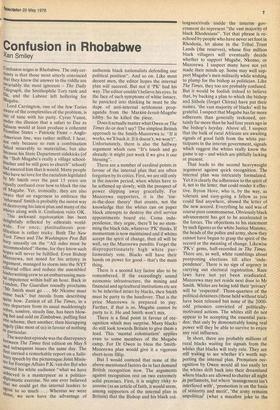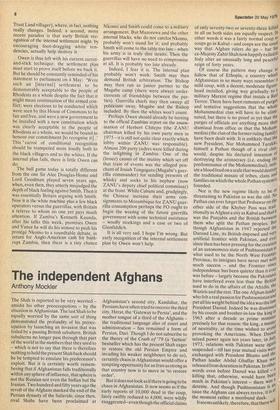Confusion in Rhobabwe
Xan Smiley
Confusion reigns in Rhobabwe. The only certainty is that those most utterly convinced that they know the answer to the riddle are invariably the most ignorant — The Daily Telegraph, the Smithophile Tory rank and and the Labour left hollering for Mugabe.
Lord Carrington, one of the few Tories aware of the complexities of the problem, is out of tune with his party. Cyrus Vance, under the illusion that a safari to Dar es 8,..alaam would at least produce a coherent rrontline States — Patriotic Front — AngloAmerican line, was rather miffed, I hear, not only because so rum a combination failed miserably to materialise, but also because his State Department sidekicks (of the "Bob Mugabe's really a village schoolteacher and he still goes to church" school) had assured him that it would. Many people Who have no love for the racialism legislated bY Mr Smith over the past 15 years are equally confused over how to block the rise cif Mugabe. Yet, ironically, they are also a, Ware that an eagerness to embrace the reformed Smith is probably the surest way of destroying his latest plan and many of the Whites along with it. Confusion rules OK. This awkward equivocation has been delightfully reflected by editorials worldWide. For once, platitudinous pontification is rather tricky. Both The New York Times and The Washington Post ?till harp uneasily on the "All sides must be tiLeehmmodated" theme, for they know such _nopes will never be fulfilled. Even Bishop Muzorewa, not noted for his artistry in argument, managed to storm into the NYT editorial office and reduce the assembled leaderwriting crew to an embarrassing menial impotence within half an hour. Back in t:ondon, The Guardian roundly proclaims Mr Smith must go . . . Mr Nkomo must tome back" but recoils from describing quite how. Zaniest of all The Times, in a tare departure from its usual maddeningly s.obre, sombre, steady line, has been blow ing hot and cold on Zimbabwe, puffing first tilne scheme, then another, then hiccupping !agely (like most of us) in favour of nothing in particular.
, The weirdest episode was the discrepancy oetween The Times first edition on May 8
!nd subsequent issues the same day. The rst carried a remarkable report on a SalisdurY speech by the picturesque Joint Minis
ter for Foreign Affairs P.K. van der Byl who assured his white audience "what we have hieved is a masterpiece as a politicouniPlomatic exercise. No one ever believed that we could get the internal leaders to agree to so much . . . Whereas we were alone, we now have the advantage of authentic black nationalists defending our political position". And so on. Like most decent men, the editor hopes the internal plan will succeed. But not if 'PK' had his way. The editor couldn't believe his eyes. In the face of such symptoms of white lunacy, he panicked into thinking he must be the dupe of anti-internal settlement propaganda from the Marxist-Jesuit-Mugabe lobby. So he killed the piece.
Does it actually matter what Owen or The Times do or don't say? The simplest British approach to the Smith-Muzorewa is: "If it works, we'll back it. If it doesn't, we won't". Unfortunately, there is also the halfway argument which runs "It's touch and go already: it might just work if we give it our blessing". There are a number of cardinal points in favour of the internal plan that are often forgotten by its critics. First, we are still only in the interim period, when whites have to be softened up slowly, with the prospect of power slipping away gracefully. For Muzorewa supporters, it is the 'toein-the-door theory' that counts, not the knowledge that the whites can on paper block attempts to destroy the civil service appointments board etc. Come independence, they argue, there'll be no stemming the black tide, whatever 'PK' thinks. If momentum is now maintained and if whites accept the spirit of change, then all will be well, say the Muzorewa pundits. Forget the disproportionately high white parliamentary vote. Blacks will have their hands on power for good — that's the main thing.
There is a second key factor also to be remembered. If the exceedingly sound economic infrastructure, the mining and financial and agricultural institutions etc are to be inherited intact by blacks, then Smith must be party to the handover. That is the price Muzorewa is prepared to pay. Further, if that is so, Mugabe cannot be party to it. He and Smith won't mix. There is a final point in favour of recognition which may surprise. Many blacks do still look towards Britain to give them a lead. This 'mental colonisation' applies even to some members of the Mugabe camp. For Dr Owen to bless the SmithMuzorewa plan would give it a vigorous short-term fillip.
But I would contend that none of the above-mentioned factors do in fact demand British recognition now. The arguments against recognition rest on two extremely solid premises. First, it is mighty risky to assume (as an article of faith, it would seem, among supporters of the internal plan in Britain) that the Bishop and his black col
leagues/rivals inside the interim government do represent "the vast majority of black Rhodesians". Yet that phrase is reechoed by people who have never set foot in Rhodesia, let alone in the Tribal Trust Lands (the reserves), whose five million black villagers will eventually decide whether to support Mugabe, Nkomo, or Muzorewa. I suspect many have not }Tit made their minds up. Some may well support Mugabe's men militarily while wishing to plump for the bishop as politician. Like The Times, they too are probably confused. But it would be foolish indeed to believe that, by backing a plan to which the bishop and Sithole (forget Chirau) have put their names, 'the vast majority of blacks' will be grateful. I suspect that Mugabe has far more adherents than generally reckoned, certainly far more than he had four years ago in the bishop's heyday. Above all, I suspect that the bulk of rural Africans are awaiting signals of good faith from the white participants in the interim government, signals which suggest the whites really know the game is up — and which are pitifully lacking at present.
That leads to the second heavyweight argument against quick recognition. The internal plan was intricately formulated. Yet it is clearly the adherence to the spirit of it, not to the letter, that could render it effective. Byron Hove, who is, by the way, as tolerant and easy-going a fellow as you could find anywhere, abused the letter of the new accord. Everything he said was of course pure commonsense. Obviously black advancement has got to be accelerated in the forces. The objections to his statement by such figures as the white Justice Minister, the heads of the police and army, show they cannot have begun to grasp the spirit of the accord or the meaning of change. Likewise '131Cs' gems, half-recorded in The Times. There are, as well, white rumblings about postponing elections till after 'independence'. There is no sign of urgency in carrying out electoral registration. Race laws have not yet been eradicated. Muzorewa may not reside next door to Mr Smith. Whites are being told their 'privacy' will be 'respected'. Three-quarters of the political detainees (those held without trial)
have been released but none of the 2000odd prisoners convicted of politically motivated actions. The whites still do not appear to be accepting the essential paradox: that only by demonstrably losing real power will they be able to survive to enjoy any real influence.
In short, there are probably millions of rural blacks waiting for signals from the whites that blacks will truly rule. They are still waiting to see whether it's worth supporting the internal plan. Premature rec ognition by Owen would all too easily let the whites drift back into their dreamland where blacks are allowed to chatter all night ,in parliameht, but where 'management isn't interfered with', 'promotion is on the basis of seniority and merit', 'the army remains unpolitical' (what a macabre joke to the Trust Land villager), where, in fact, nothing really changes. Indeed, a second, more recent paradox is that early British recognition of the internal settlement might, by encouraging foot-dragging white tendencies, actually help destroy it.
Owen is thus left with his current carrotand-stick technique: the settlement plan must start to prove itself before we back it. But he should be constantly reminded of his statement to parliament on 4 May: 'Were such an [internal] settlement to be demonstrably acceptable to the people of Rhodesia as a whole despite the fact that it might mean continuation of the armed conflict; were elections to be conducted which were seen by this House of Commons to be fair and free, and were a new government to be installed with a new constitution which was clearly acceptable to the people of Rhodesia as a whole, we would be bound to honour our commitment [to recognise it] .' This ' carrot of conditional recognition should be trumpeted more loudly both to the black villagers and to the whites. If the internal plan fails, there is little Owen can do.
The ball game today is totally different from the one Sir Alec Douglas-Home and Lord Goodman played seven years ago, when, even then, they utterly misjudged the depth of black feeling against Smith. Then it was essentially Britain arguing with Smith. Now it is the white machine plus a few black operators versus the guerrillas, with Britain a referee to whom no one yet pays much attention. If Zambia's Kenneth Kaunda, after his talks this week, promises Owen and Vance he will do his utmost to push his protégé Nkomo to a roundtable debate, in return for Anglo-American cash for bankrupt Zambia, then there is a tiny chance
Nkomo and Smith could come to a military arrangement. But Muzorewa and the other ,internal blacks, who do not carefor Nkomo, probably won't stand for it; and probably Smith will come to the table too late — when his army is in truly dire straits. Then the guerrillas will have no need to compromise at all. It is probably too late already.
Indeed, I fear it is. The internal plan probably won't work. Smith may then demand British arbitration. The Bishop may, then run as junior partner to the Mugabe camp (there were always undercurrents of friendships between the parties). Guerrilla chiefs may then sweep all politicians away, Mugabe and the Bishop included. By then the whites won't count.
Perhaps Owen should already be turning to the official Zambian report on the assassination of Herbert Chitepo (the ZANU chairman killed by his own party men in 1975— it is still not quite clear exactly which lobby within ZANU was responsible). Almost 200 party cadres were killed during the infighting in Zambia. One of the (lesser) causes of the mutiny which set off that train of events was the alleged penchant of Josiah Tongogara (Mugabe's guerrilla commander) for sending presents of whisky and socks to his nephew (now ZANU's deputy chief political commissar) at the front. While Cubans and, grudgingly, the Chinese increase their arms consignments to Mozambique for ZANU guerrilla consumption perhaps the FO ought to begin the wooing of the future guerrilla government with some technical assistance — woolly stockings and a case or two of Glenfiddich.
It is all very sad. I hope I'm wrong. But early recognition of the internal settlement plan by Owen won't help.



































 Previous page
Previous page